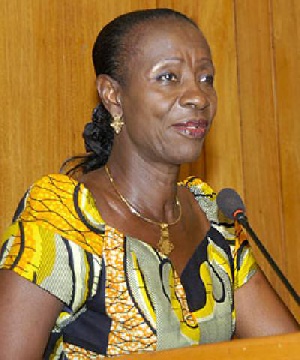Madam Sherry Ayittey, Minister of Environment, Science and Technology, on Wednesday said there was a clear cause and effect relationship between poverty and environmental degradation.
She said environmental degradation led to widespread poverty and that equally, poverty was a habitual cause of environmental degradation as it undermined people’s capacity to manage resources wisely.
Madam Ayittey said this at the launch of the National Environmental Policy document in Accra which has the vision for the management of the environment in a sustainable way to benefit the Ghanaian society.
She said the lives of all Ghanaians were intimately connected to the environment and therefore the survival and that of the future generations depended on the harmonious relationship with the natural environment.
The Environment Minister explained that Ghanaians had no choice but to strive to manage the environment and its natural resources in ways that enhance the potential for growth and opportunity for sustainable development of present and future generations.
She noted that problems of underdevelopment such as poverty, ill health and others that plague the majority of Ghanaians were both environmental and developmental.
Environmental management was therefore a social and economic necessity as well as an integral component of sustainable development and at the centre of any environmental policy.
Madam Ayittey said investment in the development of the environment and its management was vital because the first victim of acute poverty was the environment, and therefore, investment in economic development must also target poverty related environmental problems.
“Ours must aim at eradicating communicable diseases, guaranteeing food, shelter, safe water for all, employment and income generation in rural and urban areas, particularly to address poverty”.
Madam Ayittey expressed disappointment about illegal mining (Galamsey), invasion of Fulani herdsmen, pollution, climate change, land degradation, deforestation and loss of biodiversity.
She challenged Ghanaians to recognize the various demands made on the environment and reconcile those in ways which sought to maintain and enhance it for the future
She said government was currently undertaking strategies aimed at strengthening environmental governance, the financial base of social services through cost recovery, enhanced community participation and improved delivery systems.
Mr. Daniel Amlalo, Acting Executive Director, Environmental Protection Agency, said Ghana needed to ensure that natural resources exploitation, socio-cultural issues, economic strategies and institutional frameworks which constituted the four pillars of sustainability were given equal consideration in the development process.
The policy document was developed in 1992 with a government’s goal of integral and holistic management system for the environment in Ghana, aimed at sustainable development as well as seeking to unite Ghanaians in working towards a society where all residents of the country have access to sufficient and wholesome food, clean air and water among others.
Regional News of Wednesday, 7 November 2012
Source: GNA

















